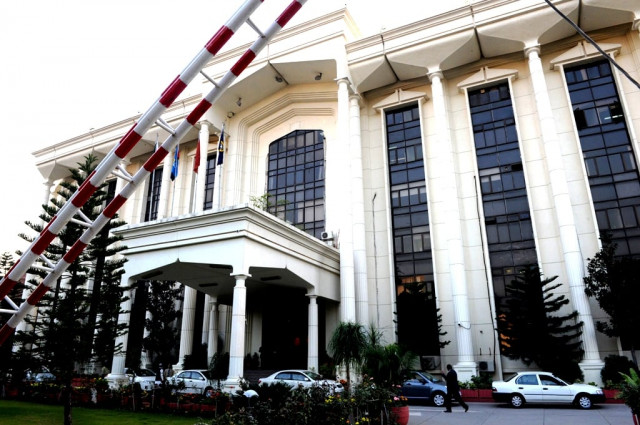Increasing revenues remains a Gordian knot as officials discuss reforms
Taxpayers identify issues with taxation system in meeting with authorities.

File phot of the Federal Board of Revenue. PHOTO: AFP
As representatives of taxpayers, KTBA members spoke vehemently against what they called a “multiplicity of jurisdictions” at the FBR. “Confusion in geographical and sector-wise jurisdictions at the FBR results in a taxpayer running from one official to another without knowing who the actual competent authority in his case is,” KTBA President Haider Ali Patel said. He added that the FBR identifies non-compliant individuals and companies every now and then, but its efforts fizzle out before any meaningful action is taken against tax evaders. “Tax fraud at an unprecedented level is taking place in Pakistan,” he claimed.
FBR Large Taxpayers Unit Karachi Chief Commissioner Rehmatullah Khan Wazir said the Pakistan Telecommunications Authority has extensive data on mobile phone users of the country, which should be used to identify people currently out of the tax net. He also called for collaboration between the FBR and the National Database Registration Authority (NADRA) in identifying people belonging to the non-taxpaying sectors of the economy, like retail and transport. Defending the performance of the federal tax collection body, FBR Regional Tax Office II Chief Commissioner Khawaja Tanveer Ahmad said an important prerequisite for broadening the tax base is documentation of the economy, which is missing in Pakistan.

Amidst loud cheers, one KTBA member grilled FBR officials for planning to tax “poor mobile phone users”, while looking the other way when faced by tax evading parliamentarians. Ahmad, however, shifted the blame onto the government, saying it showed little spine in levying taxes on powerful lobbies. “There was a 22-day strike after the Bangladeshi government decided to implement sales tax, but it was their government’s political will that it stood ground and did not budge,” he said. He was referring to the fact that Value-Added Tax (VAT) could not be implemented in Pakistan a few years ago because the government caved in to pressure.
Taking part in the discussion, Arif Habib Corporation Chairman Arif Habib said the perception that Pakistanis do not want to pay taxes is wrong. “In 2000, the tax collection target of the FBR was around Rs200 billion. Last year, it was over Rs2,100 billion, which means an annualised increase of about 20% for the last 13 years,” he pointed out. “People want to pay taxes, but they don’t want to be harassed by tax officials,” he added.
Habib also offered a novel view of Pakistan’s tax-to-gross domestic product (GDP) ratio, which stood at 9.3% in 2011 – the sixth-lowest in the world. He said that while agriculture and trading collectively represent 40% of the economy, their tax contribution is only 1% of GDP. That means, according to Habib, that the remaining 60% of the economy pays taxes that are more than 8% of GDP. “Therefore, the tax-to-GDP ratio for the compliant sectors of the economy is effectively 13.5%,” Habib observed. He also criticised national amnesty schemes that let people whiten their black money they have earned while operating in the undocumented segment of the economy.
Caretaker Minister Syed Shabbar Zaidi, whose portfolio has just been changed from finance to revenue in the interim Sindh government, said no country in the world can broaden the tax net without allowing tax authorities access to banking transactions.
The FBR does not have the mandate to inspect banking transactions under existing laws.
Published in The Express Tribune, April 19th, 2013.
Like Business on Facebook to stay informed and join in the conversation.



















COMMENTS
Comments are moderated and generally will be posted if they are on-topic and not abusive.
For more information, please see our Comments FAQ